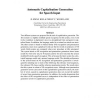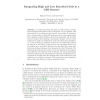97 search results - page 18 / 20 » Asymmetric acoustic modeling of mixed language speech |
SPEECH
2010
13 years 2 months ago
2010
Despite years of speech recognition research, little is known about which words tend to be misrecognized and why. Previous work has shown that errors increase for infrequent words...
CSL
2004
Springer
13 years 7 months ago
2004
Springer
Two different systems are proposed for the task of capitalisation generation. The first system is a slightly modified speech recogniser. In this system, every word in the vocabula...
IUI
2005
ACM
14 years 28 days ago
2005
ACM
A principal problem in speech recognition is distinguishing between words and phrases that sound similar but have different meanings. Speech recognition programs produce a list of...
ICASSP
2009
IEEE
14 years 2 months ago
2009
IEEE
Maximum-Likelihod Linear Regression (MLLR) transform coefficients have shown to be useful features for text-independent speaker recognition systems. These use MLLR coefficients ...
CIARP
2003
Springer
14 years 17 days ago
2003
Springer
In Continuous Speech Recognition (CSR) systems, acoustic and Language Models (LM) must be integrated. To get optimum CSR performances, it is well-known that heuristic factors must ...


